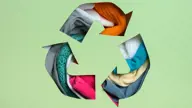Circularity 22
4 minute read
I was fortunate to join 800+ professionals at GreenBiz Group’s Circularity22 conference in Atlanta, Georgia this May. The event focused on how we can all move beyond individual action to catalyze systems change and accelerate the circular economy. In order to extend the lives of the natural resources we use, we must collaborate and innovate across value chains, as well as drive policy change.
Here are our key takeaways and actions coming out of the event:
1. Circular Design: Recycling allows us to circulate materials but over time, both material quality and quantity are lost so recycling cannot be our only solution and we need circular design solutions. adm team members are consistently attending expos and conferences to engage new partners that can offer increasingly advanced technology, sustainable materials and circular logistics support. adm Sustainability Team will release an internal Sustainable Design Guide in Summer 2022 to help account teams, marketers, procurement and clients develop more circular and lower-carbon footprint items.
2. Close the Loop: Brands must be vocal about their willingness to think and design their items and packaging differently, with an emphasis on exploring reverse logistics that will get them their products back (close the loop). adm is exploring different ways of closing the loop with both new and existing suppliers. We already work with Everywhere US to produce apparel items. Consumers can order free return mailers online and send their t-shirts back to Everywhere, directly, in exchange for future product discounts.
3. Plastics Recycling: There are over 9,000 recycling programs operating under different rules throughout the country. It is imperative for us to harmonize our methods and set ourselves up to be able to evolve with technology and future innovation if we are going to fix the recycling problem. At the UN General Assembly on March 2, UN member states unanimously voted to establish the Global Plastic Policy Treaty within the next 2 years. It is a legally binding agreement to end plastic pollution by addressing the full lifecycle of plastics, including production, design, and disposal.
At adm, we strive to make items plastic free or with reduced plastic. In 2021, we achieved a 60% reduction in plastic packaging in the GSC and we have committed to these 2030 plastic and packaging goals:
- adm will ensure that 100% of plastic in our items is designed to be widely recycled, reusable or certified compostable.
-
adm will ensure 100% reusable, recyclable, or certified compostable packaging for all items.
4. Reporting: If we are going to meet our corporate sustainability goals, we need to be able to measure operational improvements, benchmark performances, track progress, and evaluate process efficiency. We are currently collaborating with a third party to develop a customized tool that will allow us to measure the carbon impact of our items. The tool will be ready for implementation in Summer 2022.
adm also releases an annual A Better Tomorrow sustainability report, participates in on-going reporting as part of AIM-Progress, and submits annual reports to Climate Disclosure Project and the United Nations Global Compact.
5. Mindset is Everything: We can do better and we have already come a long way in shifting our thinking. We need everyone’s creativity and willingness to challenge the status quo! Employees can take action to reduce at home or in-office waste by:
- Avoid printing, if possible and if not, print using sustainably sourced (FSC) paper
- Using a refillable water bottle
- Recycling paper, cardboard, aluminum and plastic in appropriate bins
- Avoiding plastic cups and disposable cutlery
- Bringing, rather than buying, lunch to avoid packaging and food waste
- Opting for hand dryers over paper towels
- Measuring waste impact. The adm Hong Kong offices have begun to collect and track their in-office recycling efforts by weighing recycled material weekly. Our Stamford, CT office is going to work toward executing a similar program in 2023.
Save energy by:
- Unplugging electronics when not in use
- Making sure windows and doors are closed if AC or heat is on
- Adapting dress codes so all can be comfortable on hot days without over-doing the AC
- Using LED lights
- Reducing digital energy expenditure by cleaning up shared drives, sending less emails with large attachments / images, avoiding copying too many colleagues on emails and skipping “thank you” emails to the group
Live greener by:
- Encouraging Meatless Mondays
- Aiming to stock the office refrigerators with organic, seasonal and healthy choices for employees
- Composting food scraps
- Carpooling, biking, scooting, walking or using public transport to get to work
- Avoiding unnecessary work travel for meetings that can be held remotely
- Voting!
Authored by Ali Pellegrino, Sustainability Manager






